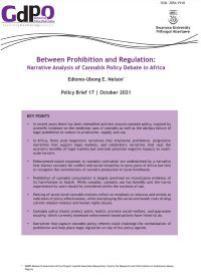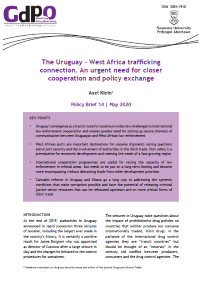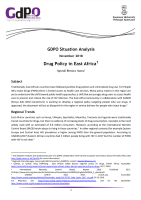The complexities and contradictions of drug markets and drug policy across Africa invites sustained critical interrogation. The Africa research project intervenes in this context with the aim of fostering a better understanding of drug market dynamics as well as build the evidence-base to support progressive change. The project is particularly concerned with interrogating the role of drugs (i.e., their production, distribution and consumption) in the everyday lives Africans. This includes how drug consumption is shaped by social, political and economic forces operating within specific contexts, and how patterns of consumption are situated within broader experiential trajectories across the lives of individuals who consume drugs. The project also contributes to elucidating the impacts of criminalization on drug markets. This includes how enforcement-based responses shape drug markets, foster corruption in law enforcement institutions as well as exacerbate the structural vulnerability of people who use drugs. The last, but by no means the least, thematic focus is alternative approaches to drug control. Under this theme, the project assesses drug treatment service provisioning, the development of harm reduction programmes, and the regulation of pharmaceuticals. It focuses on the frictions between these services and the criminalization of people who use drugs, the political-economic forces that structure service provision and uptake, and how service users navigate these complexities.

 All GDPO material published on this website is licensed under a CC-BY Creative Commons Attribution 4.0 International License.
All GDPO material published on this website is licensed under a CC-BY Creative Commons Attribution 4.0 International License.
Between Prohibition and Regulation:
Narrative Analysis of Cannabis Policy Debate in Africa
GDPO Policy Brief 17, October 2021
Ediomo-Ubong E. Nelson
A strong case can be made that cannabis prohibition, institutionalized in the UN narcotics conventions, is a colonial and racist remnant that undermines traditional practices, threaten livelihoods, and widens the reach of the criminal justice system. This is highly evident in Africa, where legal prohibition has often interfered with religious, cultural, and therapeutic uses of the plant, threatened the livelihoods of local communities and increased prison populations through incarceration of young people, mostly for possession of small quantities of cannabis for personal use.
Read the fully policy brief: Between Prohibition and Regulation
The Uruguay – West Africa trafficking connection:
An urgent need for closer cooperation and policy exchange
GDPO Policy Brief 14, May 2020
Axel Klein
Uruguay’s emergence as a transit route for cocaine provides new challenges to international law enforcement cooperation and creates greater need for setting up secure channels of communication between Uruguayan and West African law enforcement.
Read the full brief here: Uruguay-West Africa Connection
Drugs Policy in East Africa
GDPO Situation Analysis, November 2018
Apondi Bernice Auma
Traditionally, East African countries have followed punitive drug policies and criminalised drug use. For People Who Inject Drugs (PWID) there is limited access to health care services. Many policy makers in this region are yet to understand the shift toward public health approaches; a shift that encourages drug users to access health care to prevent and reduce the risk of HIV infection. The East Africa Community in collaboration with KANCO (Kenya Aids NGO Consortium) is working to develop a regional policy targeting people who use drugs. If approved, the document will act as blueprint for the region in service delivery for people who inject drugs.
Read the full analysis here: Drug Policy in East Africa
South Africa's National Drug Master Plan: Influenced & Ignored
GDPO Working Paper 4, August 2018
Shaun Shelley and Simon Howell
The fourth South African National Drug Master Plan (NDMP), for the period covering 2018-2022, was recently released. The plan, developed by the Central Drug Authority (CDA), is intended to ‘outline the contribution and role of various government departments at national and provincial level in fighting the scourge of substance abuse.’ Theoretically the document is mandated to provide South Africa’s national, overarching policy framework with which to inform the country’s response to the use of drugs on all fronts – including the broad strategy for the reduction of the distribution and supply of drugs, as well as the interdepartmental framework for the resolution of substance use disorders and the mitigation of harm related to the use of substances in general.
Ghana Strives for a More Humane Drug Policy
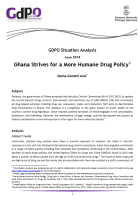
Maria-Goretti Ane
Recently, the government of Ghana proposed the Narcotics Control Commission Bill of 2017 (NCC) to replace the current Narcotic Drugs (Control, Enforcement, and Sanctions) Law of 1990 (PNDCL 236) that criminalizes all drug-related activities including drug use, possession, trade, and production. NCC aims to decriminalise drug consumption in Ghana. The initiative is a recognition of the grave impact on public health of the country’s current drug legislation, which imposes punitive sanctions on those engaged in the consumption, production, and trafficking. However, the ramifications of legal change could be felt beyond the country as Ghana could become a norm entrepreneur in the region for harm reduction policies....
Read the full analysis here: Ghana Strives for a More Humane Drug Policy
When Agendas Collide: Combating Drugs and Organised Crime in West Africa
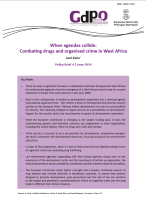
Axel Klein
A new Policy Brief from GDPO analyses the confluence of the European Union’s development policies and external security initiatives in West Africa. Development objectives have taken a backseat to law enforcement, and many programmes suffer from a lack of distinction between fighting multiple forms of organised crime and combating drug trafficking. To rectify the situation, law enforcement agencies cooperating with West African partners should draw on the experience of the development sector. The European Commission should improve oversight and undertake a broader contextual analysis of drug markets and criminal activities in beneficiary countries to ensure that projects designed to promote development, good governance and the rule of law are sensitive to the impact and potentially counterproductive effect on organised crime and the drug trade in different West African theatres.
Read the full brief here: When agendas collide Combating drugs and organised crime in West Africa
European Policy on Khat: Drug Policy lessons not learned
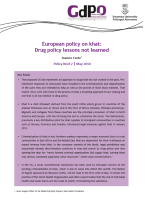
Joanne Csete
With the UK likely soon to follow other European countries in introducing a ban on khat, a currently legal mild stimulant used by some African communities within this country, this policy brief examines how previous prohibitionist responses have failed to influence the market as intended. As is discussed, not only have khat bans resulted in the criminalization and stigmatization of users that they are intended to help, they have also led to the creation of illicit black markets. Moreover, criminalization of khat in key Northern European markets represents a major economic blow to rural producer communities in East Africa and the Middle East that are dependent for their livelihoods on the export of khat. Since expert views on the topic have been sidelined during discussions and the Home Secretary determined to push forward with the ban, a novel constitutional mechanism has been used to articulate concern at the pending criminalisation of khat. In the House of Lords, a Motion of Regret will be read in the first week of May. It will echo the position of the World Health Organization and other expert bodies that the risk of individual heath and social harms are too small to justify criminalising the substance.
Click here to view the European Policy on Khat press release: Khat Ban Press Release
Cannabis and the Drug Law in Tunisia: A Reform Rooted in Social Justice Claims
Khalid Tinasti
Drug control policies in Tunisia are guided by the 1992 Narcotics Act (Act 92-52), adopted under the dictatorship following the 1987 Coup d’Etat. Until April 2017, the Act was one of the most punitive drug control laws in the world, sentencing people convicted of drug use or possession of small amounts to a mandatory minimum of one year in prison, and a monetary fine of 1000 Tunisian Dinars (400 USD). The specificity of this law has been the mandatory nature of its sentences, and the incapacity of judges to take into account mitigating circumstances, making it the only law in the Tunisian criminal code depriving judges of their discretion. This specific legal provision, as dictated by article 12 of the Act, was amended by the Tunisian Parliament in April 2017 to address prison overcrowding...
Read the full analysis here: Cannabis and the Drug Law in Tunisia A Reform Rooted in Social Justice Claims
Telling the story of drugs in West Africa: A New Front in a Losing War?
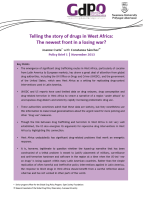
Joanne Csete with Constanza Sánchez
The emergence of significant drug trafficking routes in West Africa, particularly of cocaine from Latin America to European markets, has drawn a great deal of attention from global drug authorities, including the UN Office on Drugs and Crime (UNODC) and the government of the United States, which sees West Africa as a setting for replicating drug-control interventions used in Latin America. West Africa undoubtedly has significant drug-related problems that merit an energetic response, but this paper questions whether the hyped-up narrative that has been constructed of a lethal problem is meant to justify placement of military, surveillance and anti-terrorism hardware and software in the region at a time when Latin American countries are saying they have had enough of the US-led ‘war on drugs’ in their territories. The response to illicit drugs in West Africa should benefit from a careful reflection about what has and has not worked in other parts of the world.
Read the full brief here: West Africa A New Front in a Losing War
Click here to view the West Africa Policy Brief Press Release

